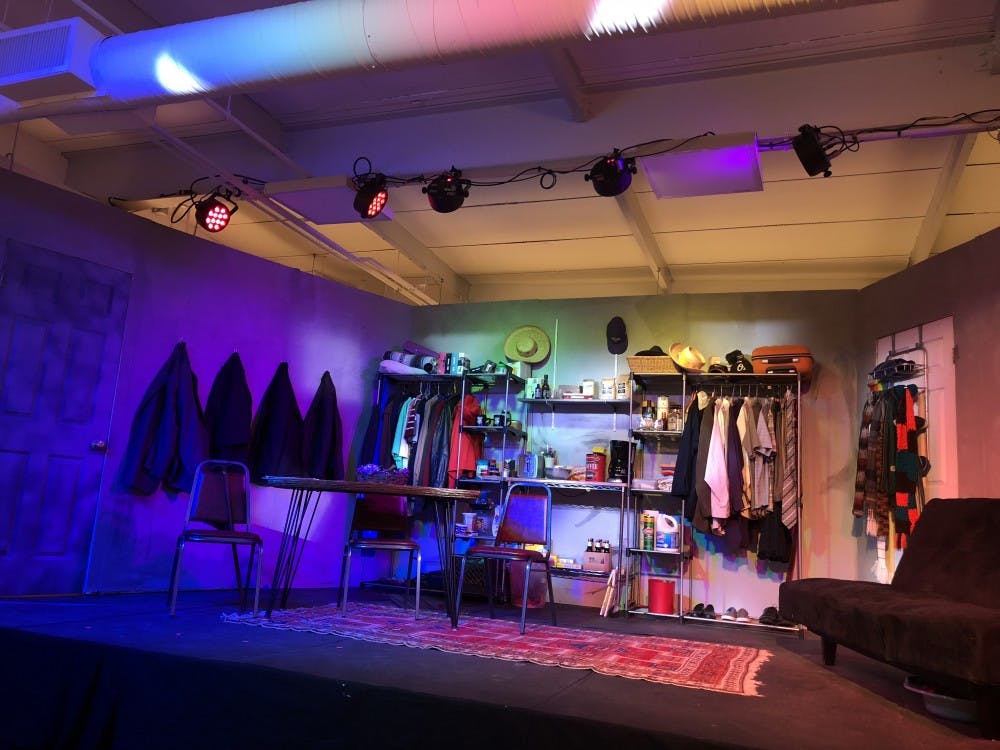Third Wall Productions’ In the Closet revolves around one gay man’s experiences in the closet. Let me be straight with you, though; I’m coming out and saying that the play was a flaming disappointment.
As a young gay man myself, I had high expectations for an award-winning play that promised a cross-generational examination of what it means to be in the closet. (Before its January run — directed by Emily Daubenmire — at Function Coworking Community, In the Closet was performed in Washington, D.C. and Cleveland. It has placed in five national competitions, including the 2016 Baltimore Playwrights Festival, where playwright Siegmund Fuchs received the trophy for Best Play.) Indeed, the cast spans four gay men of varying ages who have entered the closet for different reasons. Man #1 (H. Ray Lawson), whose partner is dying of cancer, has returned to the closet at age 65 because of homophobic nursing homes. Man #2 (Michael Zellhofer), in his 40s, is feeling increasingly out of place in the gay community as he ages: “What happens,” he asks, “when your sexuality determines your identity but you’re no longer sexual?” Man #3 (Stephen Foreman), a twenty-something, is denying his sexuality under oath so that the jury will believe that he was raped. Finally, teenager John (Angel Duque) gallops into the closet after having gay sex for the first time.
The show is set in the metaphorical closet and also in a literal one. Set designer and builders Patrick Rudai and Jordan Hollett deliver Fuchs’ smart and fresh premise with an adroitly decorated, albeit mildly congested, stage. Underscoring another of Fuchs’ clever ideas, John arrives at the revelation, just before the intermission, that the three men are progressively older versions of himself. This brilliant concept subverts and imparts nuance to the conventional queer narrative by illustrating that coming out is not a one-time event but instead a lifelong process.
Yet, In the Closet comes crashing down from somewhere over the rainbow of genius in its execution. The play inherently occurs outside of reality; there can be no plot, only exposition through dialogue. Sadly the exposition is slow, and the dialogue is frankly boring; it’s almost too natural in its clunkiness (“I forgot to ask. How are you doing?”). And there’s little to no wit, only obvious laugh lines. “I’m gay, and I’m middle-aged; I always have groceries” wasn’t funny the first, second or third time Zellhofer said it.
Furthermore, Fuchs seems to hope that his audience is filled to the brim with simpletons who won’t question the parameters of the closet. I was unable to suspend my disbelief because the conditions of the closet were poorly defined. It’s unclear how it functions with the passage of time in the real world and whether John remembers entering or escaping it.
After the play, Fuchs and the cast took questions from the audience and shared their insights and experiences. Fuchs explained that many attendees of previous talkbacks had drilled him about the metaphysics of the closet.
“I don’t even know if I know all the rules of the closet, which is why I added the line twice ‘it’s a metaphor,’” he said. “It’s a line to the audience, like just stop trying to figure out the freaking rules of the closet. Listen to the story.”
In my opinion, Fuchs owes playgoers more than a half-hearted excuse and a half-baked universe. Yes, Fuchs has laid a solid foundation, but In the Closet would have been far more intellectually stimulating if he had gone greater lengths to construct the closet — if he had exercised more intention to reach the pot of gold waiting for him at the end of the rainbow.
I appreciate that In the Closet did not relay the rules of the closet in explicit and excessive detail. But, in my opinion, that Fuchs himself doesn’t have them figured out is something that members of the audience can detect. And I think it’s this that limits the audience’s ability to empathize with the characters, along with the frequent clichés and the melodramatic quality of their speeches. In the Closet would have been more powerful if the characters had spent more time showing their emotions instead of telling them, which oversimplified character development and the play’s themes and message.
As a result, the actors carry a heavy burden to connect with the audience. Foreman is most successful, his performance sensitive and evocative, with Duque coming in a close second. During the talkback, Foreman shared that he did extensive research on the psychology and testimonies of rape victims; his conscientiousness shined. He ascribed the authenticity of his portrayal, however, to the excellence of the script. (Fuchs explained that his academic work concerns rape victims, which certainly benefited the play.)
Like Foreman, Lawson clearly cared a great deal about his character, whom Fuchs described as the play’s protagonist (the show ends with John convincing Man #1 to exit the closet with him). Unfortunately, Lawson often had trouble remembering his lines. Zellhofer also had his moments of glory, but his delivery was, for the most part, rather awkward.
Nonetheless, I particularly enjoyed the chemistry between the actors, which they attributed to Daubenmire’s casting. It was a highlight of In the Closet but not its saving grace.
Indeed, the actors’ obviously close bonds to one another, though they made the show more resonant, failed to compensate for the enormous faults of the script.





